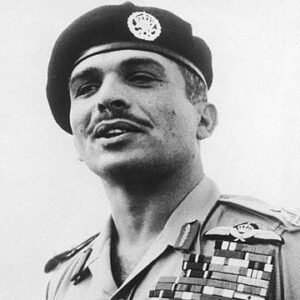Jordan’s King Hussein bin Talal reigned from 1952 until his death in 1999. He was the world’s longest-serving executive head of state at the time of his death. When his father, the reigning king, Talal I bin Abdullah, was forced to vacate the throne owing to health issues in 1952, he ascended the kingdom. The crown prince, Hussein, was therefore proclaimed the new King of Jordan’s Hashemite Kingdom. Because Hussein was only 16 years old at the time, a Regency Council was created to govern him until he reached the age of majority. King Hussein believed in keeping peace and opposed war since he believed it was pointless. When he came to power, Jordan was in the midst of a period of unrest and turbulence, and he did everything he could to bring stability and peace to the Middle East. His people dubbed him “Al-Malik Al-Insan,” or “The Humane King,” because of his caring attitude and nonviolent endeavors. Throughout his long reign, he concentrated on the country’s growth and contributed significantly to improving Jordanians’ quality of life. Between 1981 and 1991, Jordan had the fastest annual rate of drop in infant mortality in the world. He was a globally admired figure who is sometimes referred to as the “Father of Modern Jordan.”
Childhood and Adolescence
In Amman, on November 14, 1935, he was born to Prince Talal bin Abdullah and Princess Zein al-Sharaf bint Jamil. Prince Muhammad and Prince El Hassan were his two brothers, while Princess Basma was his sister.
He acquired his primary schooling in Amman before moving to Egypt to further his study. He traveled to England to study at the Harrow School after studying at Victoria College in Alexandria, Egypt. He also attended Sandhurst, the Royal Military Academy.
On the 20th of July 1951, he and his grandfather, King Abdullah I, were in Jerusalem for Friday prayers at the Al-Aqsa Mosque when a Palestinian assassin opened fire on the king and the prince. The king was killed in the attack, but Hussein was spared because a bullet was deflected by a medal he was wearing.
Following the death of his grandfather, Hussein’s father, Talal, became King of Jordan, and Hussein was named Crown Prince. His father, on the other hand, had mental health issues and was unable to effectively manage his obligations; he was eventually diagnosed with schizophrenia.
Reign & Accession of King Hussein of Jordan
Due to King Talal’s illness, he was compelled to quit the throne, and Crown Prince Hussein was declared King of the Hashemite Kingdom of Jordan on August 11, 1952. Hussein was just 16 years old at the time, thus a Regency Council was created to govern him until he reached the age of majority.
To demonstrate Jordanian independence, he replaced all British officers in the Jordanian Army with Jordanians in 1956.
He met with Israeli officials Abba Eban and Golda Meir on multiple occasions in attempt to build friendly relations between the two countries. Jordan and Israel had been at odds for a long time, and he did his hardest to find a peaceful solution.
He was truly concerned about the well-being of his people and placed a strong emphasis on the country’s industrial and economic development. Several businesses were constructed, and the country’s principal industries—phosphate, potash, and cement—performed admirably.
He concentrated his efforts on ensuring that suitable infrastructure, such as roadways and waterworks, were constructed across the country. The Jordanians’ standard of living improved dramatically during his tenure.
He made sure that basic essentials like clean water, sanitation, medical care, and healthy food were available to the vast majority of people who had been without them for a long time.
He thought that the people were the country’s most valuable asset, and he lent his entire support to the poor, disabled, and orphaned in their efforts to better themselves and become active citizens.
He was passionate about democracy and human rights, and Jordan is widely regarded as having the best human rights record in the Middle East. Jordan’s parliamentary elections in 1989, 1993, and 1997 were widely regarded as among of the most transparent in the Middle East.
Personal History and Legacy
He married Sharifa Dina bint ‘Abdu’l-Hamid, an Egyptian-born former lecturer in English literature at Cairo University, in 1955. They had a daughter the following year, but their marriage did not endure long, and they divorced soon after.
In 1961, Antoinette Avril Gardiner, a field hockey player and the daughter of a British army officer, became his second wife. This union resulted in the birth of four children. After a decade of marriage, the pair divorced in 1971.
In 1971, he married Alia Baha el-Din Toukan, an Egyptian-born Palestinian. Alia has two children with her husband, and the couple has also adopted a baby daughter. His third wife, unfortunately, died in a helicopter mishap in 1977.
In 1978, he married for the second time. Lisa Najeeb Halaby, an Arab-American of Syrian heritage, was his fourth wife and the daughter of Najeeb Halaby. He had four more children as a result of this marriage.
In the late 1990s, he was diagnosed with lymphatic carcinoma for the second time; he had already lost a kidney to the disease. On February 7, 1999, he passed away.
He was a popular king, and at his funeral on February 8, 1999, over 8,000 Jordanians paid their homage to him. His funeral was also attended by a number of foreign leaders and statesmen. On the same day, the United Nations General Assembly conducted an Emergency Special Session in “Tribute to the Memory of His Majesty the King of Jordan.”
Estimated Net Worth
King Abdullah II of Jordan is Jordan’s current monarch, having succeeded his father, King Hussein, in February 1999. King Abdullah has a net worth of $750 million as of this writing.


